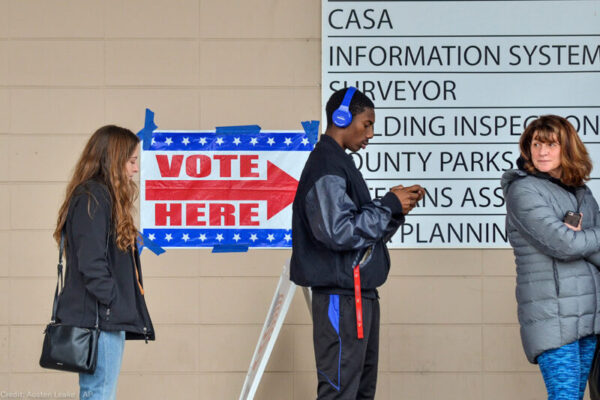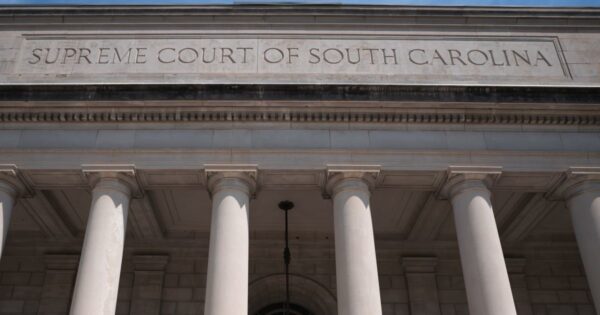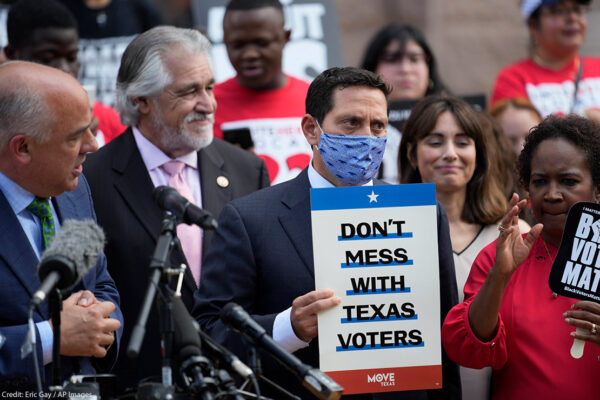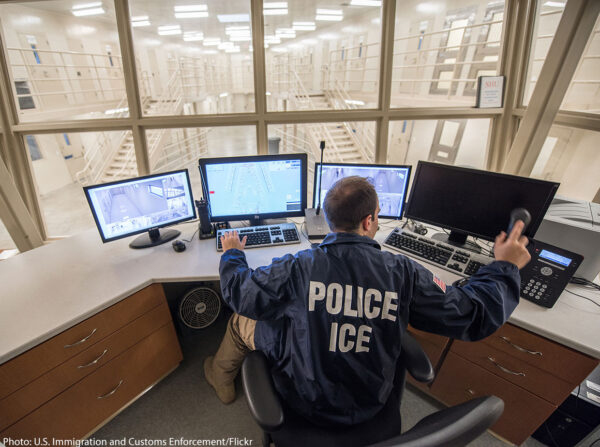Supreme Court Term 2024-2025
We’re breaking down the cases we've asked the court to consider this term.
Latest Case Updates
Ongoing Updated April 9, 2025
Ongoing Updated March 24, 2025
Ongoing Updated March 11, 2025
Ongoing Updated January 23, 2025
Featured
Washington, D.C.
Apr 2025

Voting Rights
League of Women Voters Education Fund v. Trump
On March 25, 2025, in a sweeping and unprecedented Executive Order, President Trump attempted to usurp the power to regulate federal elections from Congress and the States. Among other things, the Executive Order directs the Election Assistance Commission—an agency that Congress specifically established to be bipartisan and independent—to require voters to show a passport or other citizenship documentation in order to register to vote in federal elections. If implemented, the Executive Order would threaten the ability of millions of eligible Americans to register and vote and upend the administration of federal elections.
On behalf of leading voter registration organizations and advocacy organizations, the ACLU and co-counsel filed a lawsuit to block the Executive Order as an unconstitutional power grab.
Maryland
Apr 2025

Religious Liberty
LGBTQ Rights
Mahmoud v. McKnight
On April 9, 2025, the ACLU and ACLU of Maryland filed an amicus brief with the U.S. Supreme Court supporting the Montgomery County Public Schools (MCPS) in its efforts to ensure that its English Language Arts curriculum is LGBTQ-inclusive.
U.S. Supreme Court
Mar 2025

Voting Rights
Callais v. Landry
Whether the congressional map Louisiana adopted to cure a Voting Rights Act violation in Robinson v. Ardoin is itself unlawful as a gerrymander.
New Hampshire
Mar 2025

Voting Rights
Coalition for Open Democracy v. Scanlan
This lawsuit challenges HB 1569, a new law that will make New Hampshire the only state to require every person to produce documentary proof of citizenship when they register to vote for both state and federal elections. It also challenges HB 1569’s elimination a preexisting protection for voters—namely, an affidavit option that allowed voters who faced surprise challenges to their eligibility at the polls to swear to their qualifications and cast a ballot. Accordingly, HB 1569 violates the First and Fourteenth Amendments of the U.S. Constitution by placing substantial burdens on New Hampshirites at all stages of the voting process, and will arbitrarily disenfranchise hundreds, if not thousands of qualified voters.
South Carolina Supreme Court
Jan 2025

Voting Rights
League of Women Voters of South Carolina v. Alexander
This case involves a state constitutional challenge to South Carolina’s 2022 congressional redistricting plan, which legislators admit was drawn to entrench a 6-1 Republican majority in the state’s federal delegation. Plaintiff the League of Women Voters of South Carolina has asked the state’s Supreme Court to conclude that the congressional map is an unlawful partisan gerrymander that violates the state constitution.
Louisiana
Jan 2025

Voting Rights
Nairne v. Landry
Nairne v. Landry poses a challenge under Section 2 of the Voting Rights Act of 1965 to Louisiana’s House and Senate legislative maps on behalf of plaintiff Black voters and Black voters across the state.
Georgia
Oct 2024

Voting Rights
Eternal Vigilance Action, Inc. v. Georgia
The ACLU and partner organizations have sought to intervene in this case to represent the rights of voters and voting-rights organizations in a case challenging a number of rules passed by the Georgia State Election Board. We challenge a rule that requires that the number of votes cast be hand counted at the polling place prior to the tabulation of votes. This rule risks delay and spoliation of ballots, putting in danger voters’ rights to have their votes count.
Texas
Oct 2024

Voting Rights
OCA-Greater Houston v. Paxton
Texas has growing Hispanic and Black populations that helped propel record voter turnout in the November 2020 election. The Texas Legislature responded to this increased civic participation with an omnibus election bill titled Senate Bill 1—SB 1 for short—that targeted election practices that made voting more accessible to traditionally marginalized voters like voters of color, voters with disabilities, and voters with limited English proficiency. Since 2021, SB 1 has resulted in tens of thousands of lawful votes being rejected, and it remains a threat to democracy in Texas.
Ohio
Sep 2024

Reproductive Freedom
Planned Parenthood Southwest Ohio Region et al., v. Ohio Department of Health, et al.
The American Civil Liberties Union, the ACLU of Ohio, Planned Parenthood Federation of America, the law firm WilmerHale, and Fanon Rucker of the Cochran Law Firm, on behalf of Planned Parenthood Southwest Ohio Region, Planned Parenthood of Greater Ohio, Preterm-Cleveland, Women’s Med Group Professional Corporation, Dr. Sharon Liner, and Julia Quinn, MSN, BSN, amended a complaint in an existing lawsuit against a ban on telehealth medication abortion services to bring new claims under the Ohio Reproductive Freedom Amendment, including additional challenges to other laws in Ohio that restrict access to medication abortion in the state.
Stay informed about our latest work in the courts.
By completing this form, I agree to receive occasional emails per the terms of the ACLU's privacy statement.
All Cases
1,563 Court Cases

California
Jul 2018
Racial Justice
Sigma Beta XI v County of Riverside
RIVERSIDE, CA — In the settlement of a lawsuit against the unconstitutional Youth Accountability Team (YAT) program in Riverside County that treated thousands of youths — especially those of color — like hardened criminals for minor adolescent misbehaviors, the county has agreed to groundbreaking measures.
Explore case
California
Jul 2018

Racial Justice
Sigma Beta XI v County of Riverside
RIVERSIDE, CA — In the settlement of a lawsuit against the unconstitutional Youth Accountability Team (YAT) program in Riverside County that treated thousands of youths — especially those of color — like hardened criminals for minor adolescent misbehaviors, the county has agreed to groundbreaking measures.

Court Case
Jul 2018
Immigrants' Rights
Damus v. McAleenan
The American Civil Liberties Union, Center for Gender and Refugee Studies, Human Rights First, and Covington & Burling LLP filed a federal lawsuit challenging the Trump administration’s arbitrary detention of asylum seekers fleeing persecution, torture, or death in their countries of origin.
Explore case
Court Case
Jul 2018

Immigrants' Rights
Damus v. McAleenan
The American Civil Liberties Union, Center for Gender and Refugee Studies, Human Rights First, and Covington & Burling LLP filed a federal lawsuit challenging the Trump administration’s arbitrary detention of asylum seekers fleeing persecution, torture, or death in their countries of origin.

Court Case
Jun 2018
National Security
ACLU v. DOD – FOIA on Yemen Raid
A U.S. military raid in Yemen on January 29, 2017, left one Navy SEAL and many Yemeni civilians dead. The ACLU filed a Freedom of Information Act request in March with the Central Intelligence Agency and the Departments of Defense, Justice, and State. In May 2017, we filed a lawsuit asking a federal court to enforce the request, which asks for records including the legal basis and decision-making process used for the raid, as well as assessments of civilian deaths afterwards.
Explore case
Court Case
Jun 2018

National Security
ACLU v. DOD – FOIA on Yemen Raid
A U.S. military raid in Yemen on January 29, 2017, left one Navy SEAL and many Yemeni civilians dead. The ACLU filed a Freedom of Information Act request in March with the Central Intelligence Agency and the Departments of Defense, Justice, and State. In May 2017, we filed a lawsuit asking a federal court to enforce the request, which asks for records including the legal basis and decision-making process used for the raid, as well as assessments of civilian deaths afterwards.

U.S. Supreme Court
Jun 2018
Privacy & Technology
Carpenter v. United States
The Supreme Court ruled that the government needs a warrant to access a person’s cellphone location history. The court found in a 5 to 4 decision that obtaining such information is a search under the Fourth Amendment and that a warrant from a judge based on probable cause is required.
Explore case
U.S. Supreme Court
Jun 2018

Privacy & Technology
Carpenter v. United States
The Supreme Court ruled that the government needs a warrant to access a person’s cellphone location history. The court found in a 5 to 4 decision that obtaining such information is a search under the Fourth Amendment and that a warrant from a judge based on probable cause is required.
